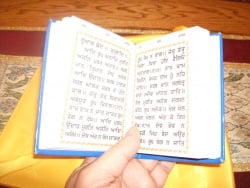Main Menu
Written Japji Sahib In Punjabi Download
пятница 07 декабря admin 63

About Japji Sahib A universal Sikh hymn called Japji Sahib was composed by the founder of the Sikh faith Guru Nanak Dev Ji. The Mool Mantra (beginning), 38 hymns (main), then the final Salok (end), all appearing in the opening verse of the Sikh Holy book, is what the Japji Sahib consists of. The first part of the Guru Granth Sahib starts with the Japji Sahib hymn.
Ik‐ōṃkār sati nāmu karatā purakhu nirabhau niravairu akāl mūrati ajūnī saibhaṃ gur prasādi. Ādi sachu jugādi sachu. Hai bhī sachu nānak hōsī bhī sachu. Download Full Japji Sahib Sukhmani Sahib Sikh prayer English Punjabi Dhur Ki Bani mobile App written text lyrics japjisahib Sri Guru Granth Sahib Waheguru.
Japji Sahib describes the God – Waheguru – as fearless, one without any form and beyond the cycle of birth and death. Japji Sahib also emphasises that one can realise Waheguru only by the kindness of the Guru. Fsx captain sim 737 200 base v100 the best free software for your. The Japji Sahib is the most important set of verses or Bani and recited daily in the mornings by everyone who practises the faith. Jap means recite/chant, Sahib Ji is to show respect and referred to as ones soul also.
(Method: Click your original file, and then click on the right key to select 'Properties' from the pop-up menu, you can see the version number of the files) • 3. If your operating system is 32-bit, you must download 32-bit files, because 64-bit programs are unable to run in the 32-bit operating system. If you know MD5 value of the required files, it is the best approach to make choice • 2. Mini kms activator v1 3 office 2010 vl eng exe. Tip: How to correctly select the file you need • 1. If your original file is just corrupted but not lost, then please check the version number of your files.
Recitation of Japji Sahib helps to strengthen the soul when one feels weak, scared or sad. The powerful verses of Japji Sahib contain the wisdom of Sri Guru Granth Sahib and help relate to your higher self. Heads must be covered, shoes must be taken off when reciting any Bani in the Guru Granth Sahib.
• • • Jap ji is a prayer at the beginning of the, considered the holy scripture of Sikhs. It was composed by, the first Guru in the line of ten Sikh Gurus. Jap ji begins with and is followed by 38 pauris (stanzas) and ends with a final at the end of this composition. Jap ji is believed to be the first composition of Guru Nanak, and is now considered the comprehensive essence of Sikh faith.
It is regarded amongst the most important or 'set of verses' by the Sikhs, as it is the first Bani in. Notable is Nanak's discourse on 'what is true worship' and what is the nature of God'. In Jap ji it is stated that God is indescribable; the only true form of worship is worship of Nam (inner Word, Sound, Power), realization of God, and to remain always in the Holy Will of that loving God, accomplished with the grace of the True Guru. Related to Jap ji is the Jaapu Sahib (::ਜਾਪੁ), the latter is found at the start of and was composed.
Japji is chanted in the Sikh tradition at the initiation ceremony and during the ceremony. Contents • • • • Meaning of Jap(u) [ ] Following are some accepted meanings of Jap: • A conventional meaning for Jap(u) is to recite, to repeat, or to chant. • Jap also means to understand. Gurbani cites Aisa Giaan Japo Man Mere, Hovo Chakar Sache Kere, where the word Jap means to understand wisdom. Content [ ] The Japji Sahib opens with hymn that 'one cannot clean the mind just by cleaning the body, by silence alone one cannot find peace, by food alone one cannot satisfy one's hunger, to be purified one must abide in love of the divine'. Hymn 2 asserts that by God's command the ups and downs in life happen, it is He who causes suffering and happiness, it is He whose command brings release from rebirth, and it is His command by which one lives in perpetual cycles of rebirth from.
With good in past life and His grace is the gate of mukti (liberation) is found; in Him is everything, states Hymn 4. The Hymn 5 states that He has endless virtues, so one must sing His name, listen, and keep the love for Him in one's heart. The Guru's shabda (word) is the protecting sound and wisdom of the, the Guru is, (Gorakh) and, and the Guru is mother.
All living beings abide in Him. Hymns 6 to 15 describe the value of listening to the word and having faith, for it is the faith that liberates. God is formless and indescribable, state Hymns 16 to 19. It is remembering His name that cleanses, liberates states Hymn 20. Hymns 21 through 27 revere the nature and name of God, stating that man's life is like a river that does not know the vastness of ocean it journeys to join, that all literature from Vedas to Puranas speak of Him, Brahma speaks, Siddhas speak, Yogi speaks, Shiva speaks, the silent sages speak, the Buddha speaks, the Krishna speaks, the humble Sewadars speak, yet one cannot describe Him completely with all the words in the world.
